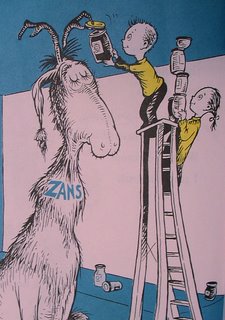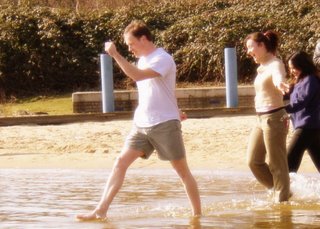Dear Elliot,
Today, we celebrate four years of you. Amazing. In some ways, it seems that you have been a part of our lives forever; "four years" just doesn't seem to do it justice. The world was a different place four years ago. Your mother and I were different people. "Home" meant something else in those days... before you... But then again, in other ways, I feel that it wasn't so long ago when I was holding you for the first time -- the smallest person I had ever seen. I can still see the cool white shadows on the snow outside the windows of Saint Luke's Hospital in Maumee, Ohio. I sang you "Thousand Miles" while you slept. And I knew that you were something special, even from the beginning moments of your life.
I've discovered that my first impressions of people have proved to be highly reliable. I don't know if this sense of intuition will be hereditary -- or if it's perhaps just human -- but I sense you'll figure it out in due time. Whatever the case may be, I knew from that first day that you were something special, and indeed the last four years have only confirmed that you are "something special" -- unbelievably unique -- even though I never could have completely envisioned or understood the full extent of this in those early days.
Now, in 2006, you are exploding out of every element of your being. Even in comparison with a scant month ago, you seem bigger, louder, heavier, taller, quicker, stronger, smarter, smoother, more sensitive, more articulate, more insightful, more meaningful. I can hardly imagine what the coming years will bring. It's actually kind of scary... But it's kind of cool, too.
When I think of you now, at the age of four, I am glad for your simple complexity. I am glad that you're four right now, and not fourteen... or twenty-four. In these times, you often wake up in the mornings by mewing like a kitty, as I'm working at my desk. And when the time is right (oh, about 7:30 or 7:45), I slide up the dial on the living room halogen floor lamp, I slide open your bedroom door, and I slide into bed beside you -- to smell you, to embrace you, to welcome my kitten to a new day. It is a highlight of my day. After you clown around for a little bit and finally tumble out of bed, we have to start getting serious for the business of the day. You don't usually want to go to "school" (
peuterspeelzaal), but you seem to enjoy it once you're there. You sing songs like "
Clowntje Piet" and "
Appel, Peer, Dag Meneer." You speak Dutch beautifully (so far as this is possible in a language with so much throat to it). You bring home colored pictures of houses and trees. And you want to talk -- not let me read my book -- while we eat lunch together. These are good times. The rest of the day is filled with games and adventures. Wrestling, running, jumping, singing. You definitely keep busy. And then you end the day by suggesting a story, listening to me invent some silly adventure, praying together (you with the first sentence, me with the rest), and drinking a cup of water. As the curtain closes on the day, you ask me to leave the door open a crack and shoo away the intimidating "red guys" from your room, so you can have a good night's sleep. And, of course, I do it for you. I wouldn't have it any other way. I know that someday -- maybe not so long from now -- your days will be filled with more serious thoughts, more introspection, more concealed emotions... But we're not in any hurry to get there.
Elliot, as I think about you, I realize that I am so proud of the person that you are becoming. I admire your spiritual sensitivity. I'm convinced that this is quite unusual for a child of your age -- even for a child of your age who is raised in an environment of ministry and mission. You thoughtfully engage with God. You really pray. You really listen for God's voice. You even concern yourself with questions about the souls of mosquitos... This is something about you that I never hope will be lost. I love your sense of compassion; it's so much more developed than my own. You consider others. You're consumed by the idea of "needy people" -- wanting to seek them out and help them even on a quiet Sunday morning when the grocery stores are closed and the Hema is dark. You have a gentle spirit. You are generous and kind. I am thrilled to have such a son. I love you very much.
You've come so far in four years, Elliot. I wonder at your potential for the years to come. Keep on trusting Jesus. Keep your heart soft; there are those who will trample a soft heart -- but even when you get trampled, keep your heart soft. Crying is good, but don't make others cry. Especially not Olivia or Mommy. Take care of your sister and your mother. Embrace the role of protector and defender. You can carry it well. I see it in you, and I believe in you.
I love you, Elliot. I'm proud of you. You're my boy, and forever I'm yours...
Dad








